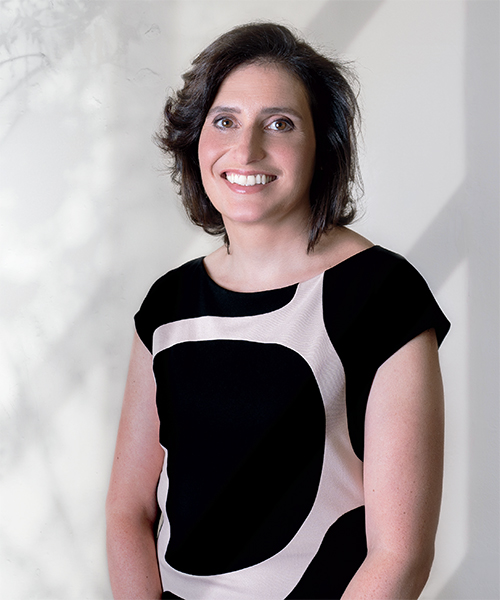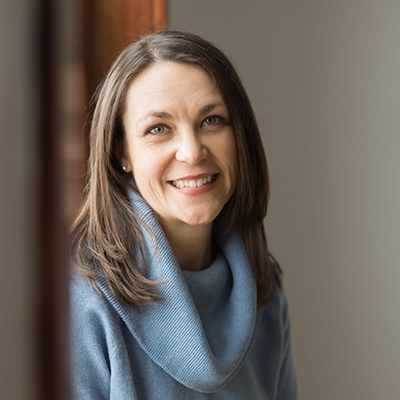Bringing Light to the Inside

Photo by Dustin Genereux
Bringing Light to the Inside
With the Pennsylvania Prison Society, Claire Shubik-Richards (’01) advocates for humane prison conditions and policies to curb mass incarceration.
In 1787, a group of influential Philadelphians—including Benjamin Rush, a signer of the Declaration of Independence, and founding father Benjamin Franklin—became disgusted with the squalor of the local jails and the public shaming of prisoners and formed a society to encourage a more compassionate correctional system. In the preamble to the society’s constitution, these citizens wrote of their obligation to extend benevolence to all people, despite their follies and crimes, and of the need for modes and degrees of punishment that could restore their fellows to virtue and happiness.
“Fast-forward to 2019, and we’re still at it,” says Claire Shubik-Richards (’01), executive director of the Pennsylvania Prison Society, the nation’s oldest human rights organization. More than 230 years after its founding, the society’s stated mission remains essentially the same: to advocate for humane prisons and a rational approach to criminal justice.
“And the need for our work has ballooned in the age of mass incarceration,” Shubik-Richards says. “Pennsylvania’s prison population has increased 850 percent in the last 40 years. Forty years ago, Pennsylvania had seven prisons. Today we have 25.”
While most US states have experienced similar growth in prison populations, the Pennsylvania Prison Society is one of just three independent-citizen organizations dedicated to monitoring state prison conditions. (The Correctional Association of New York and the John Howard Association of Illinois are the other two.)
The organization, says Shubik-Richards, has three main spheres of impact. The first is helping inmates and their families navigate the prison system. Pennsylvania law allows the society’s volunteers, known as “official visitors,” to privately meet with any inmate in the state—even those on death row or in solitary confinement— for any reason. Each month, the society receives around 250 requests from inmates or their loved ones to intercede in specific situations. While some of these requests are to investigate instances of prisoner abuse, most are related to accessing medical care or opening channels of communication. For example, official visitors have helped an inmate’s wife understand why her husband was abruptly transferred to a different prison and have relayed a mother’s message of love to a young man in solitary confinement.
“About a quarter to a third of our requests are about providing a bridge to family members,” says Shubik- Richards. “We are a profound resource at that level.”
The society’s second major role, she says, is to be a resource for the administrators of individual prisons, serving as extra eyes and ears to spot problems and identify trends within their facilities. The third is to inform policymakers and the public at large about prison conditions in the state. “Our goal is to bring light to the inside,” says Shubik-Richards, “and to bring the darkness on the inside to light.”
When she was hired as executive director in January 2017, her charge was to create a plan for reaching this goal in the era of mass incarceration. Her first step was to fix the organization’s finances. “When I joined, the society was struggling financially,” she says. “Now we’re solvent, but we’re still thinly staffed.”
The society had just two full-time employees and a handful of part-time employees when Shubik-Richards came onboard. She immediately began fundraising to hire more staff, and she’s proud that the society now has a full-time prison monitoring director who focuses on hiring and training volunteers. Today, most of the society’s roughly 300 official visitors are retirees who learn of the volunteer positions through their churches, and Shubik-Richards wants to expand and diversify this volunteer base to better serve the nearly 80,000 people incarcerated in Pennsylvania jails and prisons.
She’s also forging partnerships with other organizations that can contribute their resources to meeting the Prison Society’s goals. The society is now working with the Center for Human Rights Science at Carnegie Mellon University, for example, to compile data and issue reports on the treatment and health of Pennsylvania prisoners. The society also recently partnered with the Klein College of Media and Communications at Temple University to redesign Graterfriends, the society’s newsletter that allows prisoners to voice their opinions and concerns about criminal justice.
“We were so incredibly fortunate to have persuaded Claire to join us,” says Thomas Innes, president of the Prison Society’s board of directors and an attorney with the Defender Association of Philadelphia. “She has proved herself indefatigable and is working not only to put our society on a footing it has not had in many years but to go beyond what our hopes were even a short time ago.”

In her job as executive director, Shubik-Richards draws on her wide experience in public policy, including her former positions with the Pew Charitable Trust, the Pennsylvania Department of Public Welfare, the Vera Institute of Justice, and the New York City Civilian Complaint Review Board.
Her dedication to improving urban policy stems from her experiences growing up in New Haven, Connecticut, in the 1980s. “New Haven was the homicide capital of the country. The crack epidemic was very severe,” she says. “I grew up in the city, so I walked to school. I rode the city bus. I saw people passed out on the street. I was held up at gunpoint at the age of two with my mother. I had friends in school with me whose parents were incarcerated.”
Despite the “tough-on-crime” mentality of the time, New Haven’s criminal justice system seemed mostly ineffective, she says. “What I really saw was a criminal justice system that was often doing more harm than good and wasn’t necessarily creating safety.” As a young teen, she decided she wanted to become a lawyer. “I had this notion,” she says, “that lawyers advanced justice and promoted social change.”
At BU Law, she studied under supportive professors, she says, who helped her hone her analysis and writing skills. After graduation, she took a clerkship in the US District Court for the District of Connecticut and then a job with a private law firm in Manhattan that specialized in civil rights litigation. While the firm’s work was admirable, Shubik-Richards quickly realized she was less interested in individual casework than in correcting societal wrongs on a systemic level. She left the firm in 2003 to accept a position with the Vera Institute of Justice, a highly regarded nonprofit dedicated to criminal justice reform. “I worked at Vera for four years on various aspects of the juvenile justice system,” she says. “I worked with government agencies to undertake systemic changes—and I loved it.” She has focused her career on policymaking ever since.
While the Pennsylvania Prison Society’s volunteers work to improve conditions for individual prisoners, Shubik-Richards notes that the increased criminalization of drugs, longer sentences, and increased use of pretrial detention and community supervision have put extraordinary strain on the prison system. To reduce that strain, the society promotes legislation, policies, and practices aimed at reducing prison populations. “The issues of prison conditions and over-incarceration are interrelated,” she says. “The society uses its voice to push for systemic change.”
